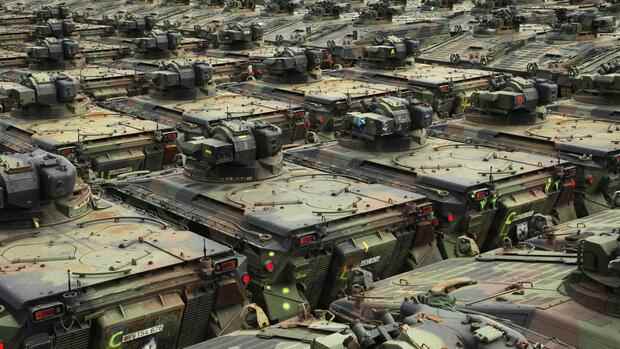Overall, the federal government approved arms exports for 9.35 billion euros last year, more than ever before.
(Photo: imago/Hans Scherhaufer)
Berlin Germany exports significantly fewer weapons to non-friendly countries. 1.2 billion euros of the armaments deliveries approved by the government so far this year have gone to countries that are not EU or NATO partners. That is 24 percent of all exports.
In 2021, when the old government coalition of SPD and Union was still responsible for export approvals until December, the value was still 63 percent. This emerges from the arms export report that the federal government approved on Wednesday.
In addition, more than half of the deliveries that were not intended for direct partner countries went to Ukraine. Germany delivered weapons worth almost 700 million euros to the state invaded by Russia.
Arms exports as a whole, on the other hand, have risen. So far, the German armaments industry has delivered weapons worth 5.1 billion euros to foreign countries in 2022. In the same period last year, it was only 2.9 billion euros. However, the value rose to 9.3 billion euros for the year as a whole, in particular due to a major delivery to Egypt.
Top jobs of the day
Find the best jobs now and
be notified by email.
The figures clearly show the new course of the federal government and in particular the leading, green-led Ministry of Economic Affairs on the subject of arms exports. Russia’s war in Ukraine ensures that its own military build-up is pushed ahead again. Germany wants to invest 100 billion euros in its own defense capability. Ukraine is supported with arms, with direct supplies and exports to EU partners, which in turn support Kyiv.
New law in the Ministry of Economics in progress
At the same time, the government is trying to stick to its course of pursuing a more restrictive policy on arms exports overall. She wrote that in the coalition agreement before the war and announced her own law on the subject. The rules for arms deliveries are to be enshrined in this “arms export control law”, the draft of which the Ministry of Economic Affairs intends to present shortly.
Russia’s war in Ukraine ensures that its own military build-up is pushed ahead again.
(Photo: dpa)
The decisions for export permits are based on various criteria that have been stipulated in different places or are not clearly defined at all. There are also criteria at both national and EU level. The government now wants to enshrine all of this in its own law. This should strengthen the control options and bring more transparency.
And Berlin also wants to extend its line to the EU. The federal government is committed to an EU arms export regulation that is intended to create more binding rules for the control of arms deliveries.
The plan is a clear change of course from the policies of the old government coalition of the Union and the SPD. The grand coalition had approved several controversial arms deals and was repeatedly criticized for this, especially with a delivery to Egypt.
>> Read here: Third relief package: The federal government could decide on these measures
Shortly before the transfer of office on December 8, the government of Chancellor Angela Merkel (CDU) and her then Vice-Chancellor Olaf Scholz (SPD) approved the sale of three warships and 16 air defense systems to the North African country.
The old government approved a big deal in the last few meters
Egypt thus became the number one recipient of German armaments, even though the country has been criticized for human rights violations and its involvement in the conflicts in Yemen and Libya.
Egypt has been criticized for human rights violations and its involvement in the conflicts in Yemen and Libya.
(Photo: dpa)
The new traffic light government immediately criticized this and announced its change of course, which Michael Brzoska from the Institute for Peace Research and Security Policy at the University of Hamburg believes could well work out. Own rearmament and a more restrictive export policy could go together.
“In the heated discussion about arms exports to Ukraine, which was characterized by speculation and suspicion, the wrong impression often arose that the delivery to a war party involved a fundamental change in German arms export policy,” he says.
On the contrary, the war in Ukraine really shows how careful you have to be with arms exports: “Supplying authoritarian regimes with weapons is playing with fire.”
More: First the party, then the country: the traffic light drifts into panic mode
